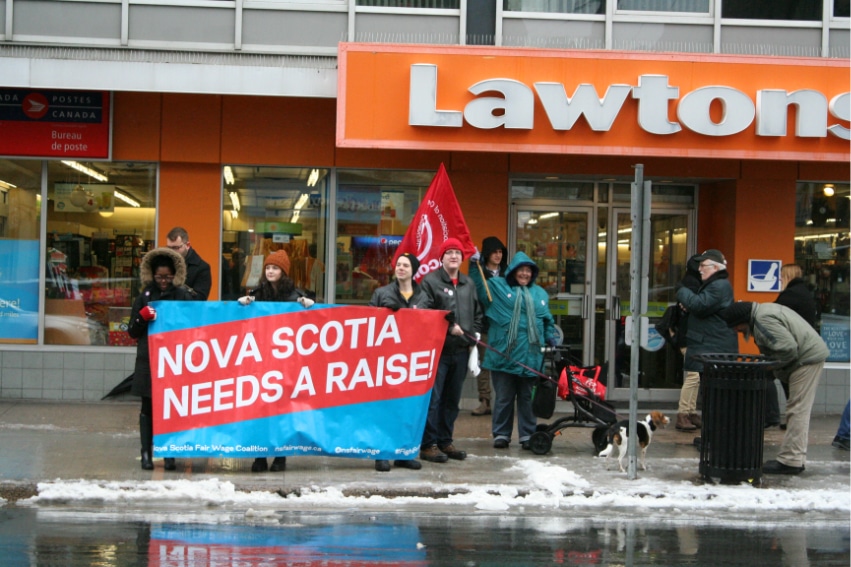Christine Saulnier is the Nova Scotia Director of the Canadian Centre for Policy Alternatives. This article was originally posted on its blog Behind the Numbers, and is republished with permission.
KJIPUKTUK (Halifax) – The upcoming provincial election has thrust into the spotlight various debates about how to best address poverty in Nova Scotia: wage increases, social programs, tax-based incentives, or a job.

Recently, the Nova Scotia New Democratic Party announced that, if elected, it would raise the minimum wage to $15 by 2020. In May of 2016, I wrote a blog about this proposal when the Nova Scotia NDP had introduced a private member’s bill that was dismissed by the Liberal government. At the time, Premier McNeil said he was concerned this wage increase would result in inflationary pressures, and raising the Basic Personal Amount (a non-refundable provincial tax credit) would be a better way to help those in low income. Since the McNeil government included cost estimates for increasing this tax credit in the budget it introduced on April 27, we can assume that the premier maintains his position.
The NS Liberals stated that their tax proposal was designed to “help those who need it the most.” The NS NDP has said that their proposal will lift hundreds of thousands of workers out of poverty. Responses to the NDP platform proposal and to the McNeil tax proposal—some of which I unpacked in my previous blog post—have been predictable and, in some cases, misinformed. In short, the relationship between wages and costs is not as simple as people often make it out to be.
The struggles of the working poor are largely the product of low wages. Earning an additional $5 per hour, or $200 per week if they are working full-time (minus taxes and payroll deductions), definitely helps people who are struggling to make ends meet at the current $10.85 for experienced workers. (The NDP would also remove the inexperienced wage rate.)
Who would be affected?
The most recent data from Statistics Canada (2016) tell us that 85% of workers earning $15 or less per hour are aged 20 or older, and a full 50% of them are their household’s breadwinner. We also know that raising the minimum wage to $15 benefits women slightly more because 57% of these workers are women. These workers represent about 29% of workers in Nova Scotia, of whom the 6% who earn the minimum wage would benefit the most. Sixty percent of low-wage earners work at businesses with 100 or more employees.
The McNeil government’s tax proposal has been refined in an attempt to target it to those with incomes under $75,000—still well beyond even the ‘middle class’ in Nova Scotia–estimating that 500,000 Nova Scotians will receive some benefit. While the full year price tag for this proposal is a whopping $85 million, the benefits, when applied, are actually quite modest; the average Nova Scotian will only deduct an additional $160 dollars when they file their 2018 taxes (in 2019).
A non-refundable tax credit is a problematic way to help people who need money now to pay for goods. The $85 million could have meant a reduction in the earnings clawback (which stands as 70% after the first $150 for most income assistant recipients) or an increase in income assistance rates. Instead the government has opted for a reduction in taxes payable, something that will not help those who already pay no or very little in taxes. The maximum amount any tax filer could deduct is $263 per worker for the full tax year, which pales in comparison to the effect that $85 million could have had if it had been put towards enhancing low-income supports, or raising the minimum wage to $15, or otherwise invested to make life more affordable for low income households.
A job is not a social program
There has been no response on the issue of raising the minimum wage from the NS PC party, though the leader is on record saying “the best social program is still a job.” That quote really puts the spotlight on the crux of the issue: not everyone can work even if they are willing—for a variety of reasons they will simply never be able to—but those who can need support to transition into jobs that will lift them out of poverty.
Raising the minimum wage is definitely part of the solution, but as Lesley Frank and I said about child and family poverty, “poverty is a social problem rooted in structures of inequality both economic and political.” Poverty is primarily measured as low income, either by comparing the incomes of Canadians, or in comparing incomes to the cost of necessities for daily living. However, it is a social condition that affects individuals and families in a multitude of negative ways and is caused by a myriad of factors including public policy.
Income, housing, and food security are essential for social well-being and economic prosperity. The social welfare programs and economic and labour policies that are designed to address (or ignore) these basic needs are political decisions rooted in ideological beliefs about the role of government in the economy and, more broadly, society. Do we, or do we not, have a collective responsibility to ensure everyone’s well-being? This is the lens through which we need to consider policies and promises.
If you can, please support the Nova Scotia Advocate so that it can continue to cover issues such as poverty, racism, exclusion, workers’ rights and the environment in Nova Scotia. A pay wall is not an option, since it would exclude many readers who don’t have any disposable income at all. We rely entirely on one-time donations and a small group of kindhearted monthly sustainers.




I’ll leave the ‘numbers’ to the politicians, which I think is simply politician speak that acts to divert and confuse the real issues surrounding poverty. There needs to be a serious paradigm shift from a paternal and punitive system, to one that no longer victim blames, shames and punishes those for being poor. A little kindness would go a long way.
Raising the minimum wage and/or increasing the provincial tax credit – only helps those who have a job. Those who are on disability assistance (as well as the non-disabled who are on social assistance ) will be ground further down as they see prices rise and their spending ability dwindle.
Linking the amount of the monthly social assistance to the minimum wage would help.
That’s exactly what I was thinking Jane, re linking assistance with the minimum wage. That certainly would give a hand up! Why aren’t we hearing anything about this for the candidates? It’s an obvious
no-brainer to me!